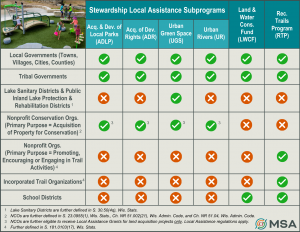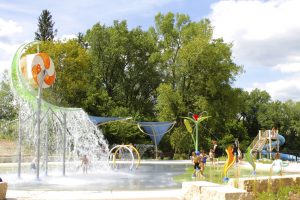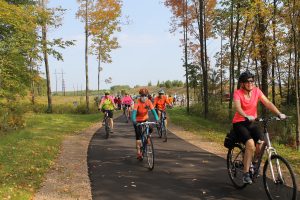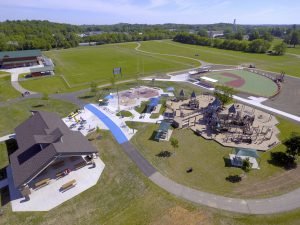It’s no secret that parks and recreational amenities enhance the quality and desirability of communities — and lend to the ever-competitive chess game of “winning” new residents, businesses, and taxpayers.
Some of the most desirable funding programs to support the development of these beloved community spaces are those administered by the Wisconsin Department of Natural Resources, both at the state and federal levels.

Knowles-Nelson Stewardship Local Assistance Grant Programs – WI
In Wisconsin, there are four stated-funded grant programs under the Knowles-Nelson Stewardship Local Assistance Grant Program umbrella to assist local units of government (LUG) attain funding for a variety of passive recreation-based projects. Some commonly funded categories include land acquisition for new parks and trails, riverfront improvements, hiking trails, bicycle paths, canoe/kayak launches, park shelters, restrooms, and accessible amenities.
- Aids for the Acquisition and Development of Local Parks (ADLP) – help communities and organizations acquire and develop land for public nature-based outdoor recreation and improve community recreation areas.
- Urban Green Space (UGS) Grants – support acquisition of land for open natural areas and community gardens within or near urban areas.
- Urban Rivers (UR) Grants – help communities restore and preserve the character of urban river corridors through the acquisition and development of land adjacent to rivers.
- Acquisition of Development Rights (ADR) – assist in protecting natural, agricultural, and forest lands that provide nature-based outdoor recreation by purchasing development rights and compensating landowners for limited future development on their land.
Eligibility Requirements & Best Practices
Who is eligible to apply?
- All four Local Assistance Grant programs are open to applications from towns, villages, cities, counties, tribal governments, and nonprofit conservation organizations (NCOs).
- However, NCOs are eligible to receive grants for land acquisition projects only.
- The Urban Green Space (UGS) program also allows applications from sanitary districts and public inland lake protection and rehabilitation districts.

Funding eligibility chart content provided by Wisconsin DNR.
Do communities need a CORP to apply?
Applicants with an adopted, current Comprehensive Outdoor Recreation Plan (CORP) are given preference for grant funding. (CORPs must be updated every five years.) If a community does not have their own CORP, they may still score well if the submitted project is identified in a CORP approved by a unit of government other than the applicant. Applicants without a CORP or tie to third-party CORP should contact their Wisconsin Regional Manager for assistance.
Do applicants need to provide a project cost?
A fairly accurate estimate of project cost is needed for these applications. With this in mind, a survey or some preliminary engineering may be necessary and should be conducted in non-winter/snow conditions when possible. Communities who have already conducted a preliminary survey or involved an engineer to produce a quality cost estimate may very well be ready for a submission by May of 2025. Those who have not might be wise to consider holding off a year to ensure their application is as complete as possible. To potentially be awarded the maximum application points, the applicant should provide an engineer-drafted plan set showing 30% of the design completed or a similar site plan as approved by the applicant’s public works department. Plan sets developed to the 30% level will yield one additional point to the application total.
Application Deadline
The application deadline: May 1, 2025 (received or postmarked by 11:59 p.m.).
Note: Beginning in 2026, applications will be due on March 1 each year, so communities will need to begin applications and design in the fall, with preliminary plans and cost estimates conducted soon thereafter to meet the earlier deadline.
These are highly competitive grants and applications are only accepted once per year, so communities should spend time to assure they are meeting eligibility requirements and putting forward a thorough, detailed proposal.

Splash pad at Fireman’s Park in Verona, WI.
Federal Recreation Grant Programs
The Wisconsin Local Assistance Grant Program also administers two federal recreation grant programs for the development of high-quality outdoor, active recreation amenities in local communities. Some commonly funded projects include land acquisition for parks and trails, sports complexes, ball fields, splash pads, trails, and trail-related facilities.
- Land and Water Conservation Fund (LWCF) – supports projects that provide outdoor recreation opportunities for the public, either regionally or statewide.
- Recreational Trails Program (RTP) – helps develop and maintain recreational trails and trail-related facilities for both motorized and non-motorized use and that further a specific goal of a local, county or state trail plan.
Eligibility Requirements & Best Practices
Who is eligible to apply?
- LWCF funding is available to state, tribal governments, local governments, and school districts. NCOs are not eligible to receive LWCP grants.
- RTP funding is offered to towns, villages, cities, counties, tribal governments, school districts, state agencies, federal agencies, and eligible incorporated organizations — those whose primary purpose is promoting, encouraging, or engaging in outdoor recreational trail activities (Ch. 181, Wis. Stats.). NCOs are not eligible to receive RTP grants.

Trillium Trail in Rib Mountain, WI.
Do communities need a CORP to apply?
Similar to the four Local Assistance Grant programs referenced above, LWCF applicants with an adopted, current Comprehensive Outdoor Recreation Plan (CORP) are given preference for grant funding. (CORPs must be updated every five years.) If a community does not have their own CORP, they may still score well if the submitted project is identified in a CORP approved by a unit of government other than the applicant. Applicants without a CORP or tie to third-party CORP should contact their Wisconsin Regional Manager for assistance.
For RTP funding, communities do not need to have a CORP in place, although it is recommended because through the planning process, public input is collected, and federal programs often request information about public engagement efforts to date on a project. In addition, while a CORP is not a requirement, RTP-hopeful projects do need to further a specific recreation-based goal or be tied to a larger State Comprehensive Outdoor Recreation Plan (SCORP).

Phoebe Bakken Memorial Park in Cottage Grove, WI.
Do applicants need to provide a project cost?
A fairly accurate estimate of project cost is needed for these applications. With this in mind, a survey or some preliminary engineering may be necessary and should be conducted in non-winter/snow conditions. Communities who have already conducted a preliminary survey or involved an engineer to produce a quality cost estimate may very well be ready for a submission by May of 2025. Those who have not might be wise to consider holding off a year to ensure their application is as complete as possible. To potentially be awarded the maximum application points, the applicant should provide an engineer-drafted plan set showing 30% of the design completed or a similar site plan as approved by the applicant’s public works department. Plan sets developed to the 30% level will yield one additional point to the application total.
Application Deadline & UEI Number
The application deadline for federal programs is the same as for the Wisconsin Local Assistance Grant Programs: May 1, 2025 (received or postmarked by 11:59 p.m.). The federal programs also share an application with the local grant programs.
Note: Beginning in 2026, applications will be due on March 1 each year, so communities will need to begin applications and design in the fall, with preliminary plans and cost estimates conducted soon thereafter to meet the earlier deadline.
As of April 4, 2022, the unique entity identifier used across federal programs changed from utilizing a DUNS Number to a Unique Entity ID (UEI) number. Entities pursuing federal funding must now have an active UEI number via SAM.gov as well as a DUNS number.
Communities wishing to pursue funding through these programs should be working on their applications well in advance of the deadline. These are highly competitive grants and applications are only accepted once per year, so communities should spend time to assure they are meeting eligibility requirements and putting forward a thorough, detailed proposal.
Resources
“Early is on time; on time is late” is an excellent adage to apply to the pursuit of Stewardship-related funding for park and recreation projects. These are competitive programs whose “winners” reap the benefits of developing and maintaining amenities that make their communities attractive places to live — for generations. Now is the time to get organized and project will need to be completed by June 30, 2028. MSA can help satisfy funding requirements, update CORPs, and boost your application’s success rate. Reach out to our in-house Funding team to get started.
Not in Wisconsin, but still looking for recreational development grant and funding assistance? Our network of Funding experts is here to help.

